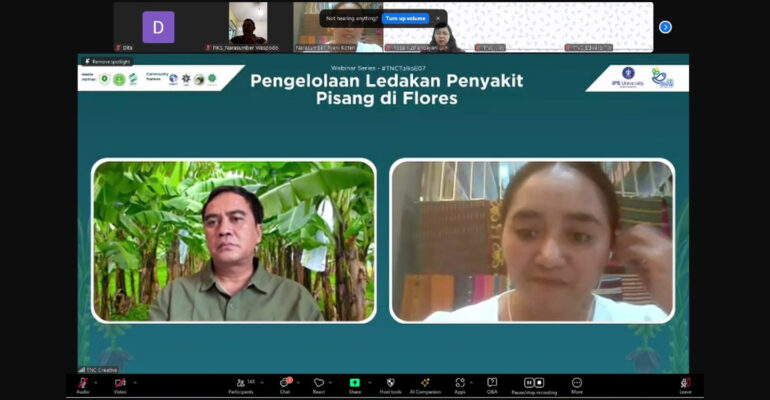TNC IPB University Encourages Collaboration to Handle Banana Disease in Flores

Tani dan Nelayan Center (TNC) IPB University bersama Koalisi Rakyat Kedaulatan Pangan (KRKP), Gerakan Petani Nusantara (GPN), Yayasan Komodo Indonesia Lestari (Yakines), and Yayasan Keanekaragaman Hayati (Kehati) succeeded in collaborating in handling banana disease that recently occurred in Flores, East Nusa Tenggara (NTT).
This was done through the Webinar Series #TNCTalksE07 with the theme “Managing Banana Disease Explosion in Flores” through Zoom Meeting and YouTube. This event attracted the attention of more than 255 participants, including farmers, agricultural extension workers, academics, and stakeholders from various sectors.
In his speech, Dr Roza Yusfiandayani as the Vice Chief of TNC IPB University, revealed that this activity aims to connect farmers, ranchers, and the maritime community with the academic community to exchange knowledge, especially in managing banana disease that is hitting Flores.
“Banana is an important commodity in Flores that has a great impact on the economy and culture of the community. Diseases that attack banana plants have caused great losses, and this webinar is expected to provide insight and solutions,” explained Dr Roza.
In line with that, Prof Ernan Rustiadi, Vice Rector of IPB University for Research, Innovation, and Agromaritime Development, emphasized the importance of collaboration in overcoming this problem.
“Banana is a strategic commodity in Flores and Indonesia. Effective banana disease control is very necessary to support food security and local economy,” said Prof Ernan.
This webinar presents a number of expert speakers, such as Gregoriana Hayani Koten, SP from Yayasan Komodo Indonesia Lestari, Waspodo Budi Prayitno, SP as the Control Officer of Plant Disruptive Organisms in the Lumajang Region, and Prof Widodo as Professor of the Plant Protection Department of IPB University.
Gregoriana explained that diseases that attack bananas in West Manggarai Regency, NTT, such as Fusarium wilt and blood disease, have caused a significant decrease in production.
“This disease not only has an impact on banana production, but also on the farmer’s economy which is highly dependent on this plant as a source of income,” she said.
In addition, Waspodo also shared experiences from Lumajang, East Java, who faced similar diseases. Through a control approach that involves the use of biological agents and sanitation improvements, Lumajang has succeeded in reducing the impact of diseases on bananas.
“Pest control with biological agents, such as Trichoderma, has been proven effective in reducing disease attacks,” he said.
Prof Widodo, in his presentation, highlighted the importance of comprehensive banana disease management, which includes symptom identification, proper sanitation, and the use of good cultivation techniques.
“Resolving the problem of banana disease requires collective efforts, from farmers to academics, to maintain environmental sustainability and food security,” he said.
Banana is an important commodity that is not only a source of food and economy, but also an important part of the cultural customs of the Flores people. Disease attacks result in a decrease in farmers’ income, disruption of cultural rites, and threats to local banana nutfah plasma.
Through this webinar, Dr Yoza hopes that farmers and extension workers can apply the knowledge gained to improve banana disease management, strengthen food security, and preserve local bananas that are part of the Flores community culture. (TNC/Rz) (IAAS/ZQA)



